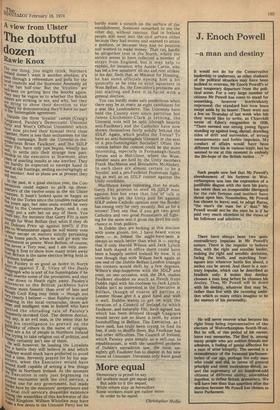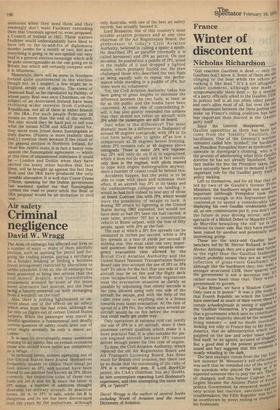1 A view from Ulster
The doubtful dozen
Rawle Knox .rh , e one thing, you might think, Northern 1.._'reland doesn't want is another election; it's nn through a referendum and polls for the al councils and the Stormont Assembly all 'LB the last half-year. But the 'loyalists' are TneII-bent on getting into the booths again. heY may be vague as to whether the British ,eliners are striking or not, and why, but they 111.e dying to show their devotion to Her inajestY by demonstrating they'll have no part the Sunningdale agreement. v Outside the three 'loyalist' camps (Craig's panguard, Paisley's Democratic Unionist bartY and West's Official Unionists) which ,"ave now pitched their hymnal tents close c`ngether, there is less than enthusiasm for the
ning campaign. Both the Unionist-in-the
derness Brian Faulkner, and the SDLP ,"`erry Fitt, have only just begun, wearily but I :veil, to settle into their strange new part , in the executive at Stormont, after cears of snarling insults at one another. They hail hardly be expected to emerge hand in ,and at the hustings, smiling encouragingly at ine another. And as plans are at present they Will not.
s In the past, in a good election year, the Conervatives could expect to pick up threecl„narters of the twelve seats in the six Ulster "tpunties. It hasn't looked quite as happy as fliat for the Tories since the troubles restarted h„ve Years ago, but nine seats would be very to the Conservative Party, and it can nardly put a safe bet on any of them. You ceeUld say, for instance that Gerry Fitt is sure ,,nnugh for West Belfast (but what if they do "Din Dolours Price up against him?); if Fitt rats to Westminster again he will surely vote beur except on matters strictly pertaining `n his home patch, when he will go with the vernment in power. West Belfast, of course, tias never a Tory seat, and I am only menfrnning it first to show how many miles away Ninnl Britain is the same election being held in
thern Ireland.
et an Paisley is as good as home in North 7,trim against T. E. Utley of the Daily ,e/egraph who is sort of for Sunningdale if he istItild rewrite some of the provisions, and that r nne down to Heath right away. Paisley's beeferences to the British jackboot have thC°Ille more frenetic than ever of late and v"°1-Igh Cecil King may think — though not sr51 Clearly I believe — that Paisley is simply Leaking in the local vernacular, there are ue!' and intelligent men in Ireland who have 43etted the obtruding tale of Paisley's tbecluently-invoked God. The demon doctor, Y say, is an evil man, in the sense that he r,sFs his intelligence to prevail on the 1111,11ibility of others in the name of religion. here are a lot of people in Northern Ireland
trying to take religion out of politics, and ley certainly isn't one of them.
inpe will however, be leading the Loyalists p:n a battle they still believe in and which 4"1-11kner would much have preferred to avoid hInil a time, fervently prayed for by his sup"01?rters, when the Executive would have stnyed itself capable of setting a few things thraight in Northern Ireland. At the moment lriExecutive is only just beginning its vate encounter with the civil service, a 61.n.laI one for any government, but made I tii'eruer here by the ministers' inexperience and local civil service's dreamlike existence the waterlilies of this backwater of the rtililed Kingdom. William Whitelaw may have "ue a few dents in the Unionist Party but he
hardly made a scratch on the surface of the establishment. Someone remarked to me the other day, without rancour, that in Ireland people still went into the civil service either because they had money and wanted to attain a position, or because they had no position and wanted to make money. That can hardly be altogether true in the North, where the service seems to have collected a number of strays from England, but it may help to explain, for instance, why Austin Currie, who has led a few squatters' sit-ins and rent strikes in his day, finds that, as Minister for Housing, he has some officials eyeing him a bit quizically as he tries to evict squatters in West Belfast. So, the Executive's problems are just starting and here it is faced with a general election.
You can hardly make safe predictions when there may be as many as eight candidates for a seat like Londonderry. The Unionists have held the County ever since partition but James Chichester-Clark is retiring, the Unionist vote will be split (though heavily anti-Faulkner) and the Catholics have now shown themselves fairly solidly behind the SDLP. Again, which profits the Tories? To have an anti-Sunningdale Unionist in the seat or a pro-Sunningdale Socialist? Often the contest before the contest could be the more interesting, especially in Fermanagh /South Tyrone and in Mid-Ulster, where the West minster seats are held by the Unity members Frank MacManus and Bernadette McAliskey. In each there are almost certain to be a 'loyalist' and a pro-Faulkner Protestant fighting as well as an SDLP runner against the Unity candidate.
MacManus keeps repeating that he made Gerry Fitt promise to send an SDLP man against him but even that line of talk is unlikely to get the Unity pair far against SDLP unless Catholic opinion near the Border has swung very far very recently. But as for a winner! They say that if you get two good Catholics and two good Protestants all fighting for the same seat it gives the devil his only chance in Irish politics. In Dublin they are looking at this election with some gloom, too. I have heard voices there — in Ireland the might-have-been is always so much better than what is — saying that if only Harold Wilson and Jack Lynch had both stayed in office there could have been a happily united Ireland by now. It is true though that with Wilson back again at one end of the Dublin-Belfast-London triangle the corners would shift by a few degrees. Wilson's slap-happiness with the SDLP and even, on one occasion, with the IRA, makes Faulkner shudder as much as Heath froze Dublin rigid with his coolness to Jack Lynch. Dublin isn't so interested in the Executive in Belfast, though of course all parties at L,einster House give it a good hand and wish it well. Dublin wants to get on with the creation of a Council of Ireland to which Faulkner, and naturally Fitt, have agreed but which has been delayed though Cosgrave would never use so blunt a term, by some footshuffling in Belfast. The Executive, as I have said, has truly been trying to find its feet, if only to shuffle them. But Faulkner has had other difficulties. The Council of Ireland, which Paisley puts simply as a sell-out to republicanism, is with the unsolved probelm of Dublin's extradition law, the most unsightly gift Faulkner has to display in his new house of Unionism. Unionists only have good memories when they need them and they seemingly don't want Faulkner reminding them that Unionists agreed to, even proposed, a Council of Ireland in 1921. These matters Faulkner would understandably have liked to have left to the to-and-fro of diplomatic mumbo jumbo for a month or two, but now everything is going to be mis-spelled out very loud in a general election campaign which will be quite unrecognisable as the one going on in Britain, but which will certainly compete with it in bitterness.
Meanwhile, there will be some in Northern Ireland quite uninterested in the election though not, as I suspect, a few might be in England, simply out of apathy. The views of Desmond Boat, so far repudiated by Paisley, of whose party Boat was once Chairman, on the subject of an Associated Ireland have been receiving wider interest from Catholic Republicans, not all of them in either branch of the IRA. For such people February 28 means no more than the end of the month. Not only would they be hard put to tell you what the initials NUM and ASLEF stand for, they never even jotted down Sunningdale in their diaries. (Paisley is more realistic than that.) I mention them because if the result of the general election in Northern Ireland, for those few twelve seats, is in fact a heavy vote against the Sunningdale agreement — which at this time of impassioned indecision it could be — London and Dublin when they have skirted the many other hurdles that face them, will be brought up against the fact that Boat and the IRA have produced the only possible alternative. It is well that Conor Cruise O'Brien, speaking for the Dublin government last weekend, spelled out that Sunningdale opened the road to peace while the Boat or IRA proposal would be an invitation to civil war.



































 Previous page
Previous page